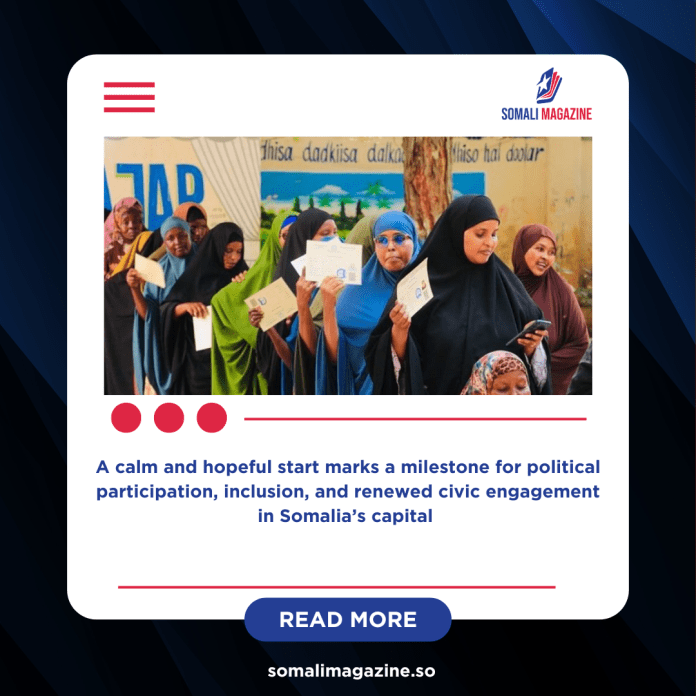Facebook Twitter (X) Instagram Somali Magazine - People's Magazine
Somalia’s electoral commission has begun issuing voter cards in Mogadishu, marking an important step toward holding local council elections in a city that has spent decades navigating conflict, instability, and displacement. The start of voter card distribution on Saturday brought a sense of optimism and participation to several of the capital’s districts, where residents turned out early to ensure they are able to vote for their local representatives.
The exercise rolled out in key districts including Hamarjajab, Waberi, Shangani, Hamarweyne, Boondheere, Abdiaziz, and Shibis. Residents described the moment as both rare and meaningful, reflecting a growing desire for political involvement and a renewed belief that elections can bring change. For many, simply receiving a voter card symbolized a step toward rebuilding civic life, strengthening representation, and giving ordinary people a say in how their communities are governed.
Across the districts, citizens expressed a strong sense of pride in taking part in the process. Fifty-five-year-old Osman Goodax Barre said he came early to collect his voter card so he could make his voice heard. Safiya Shire Dahir shared a similar sentiment, explaining that securing her voter card was essential for exercising her right to vote. These personal accounts echoed a broader feeling across the city: after years of uncertainty, many Mogadishu residents want to participate in shaping their local leadership.
One of the most notable scenes came from Shibis district, where residents with disabilities said the moment felt historic and validating. For years, many people with disabilities have struggled to participate in political processes due to accessibility challenges and limited recognition. Saalax Mohamed, the chair of the Shibis District Disability Association, said that for the first time in a long while, people with special needs felt acknowledged and included. He emphasized that being able to vote gives them a sense of belonging and dignity, reinforcing that they, too, have a stake in the future of their community.
Elderly citizens also showed up in significant numbers, highlighting that the desire to vote spans all age groups. Maxamuud Xaaji Goobe, an elder in his community, said he made it a point to collect his voter card despite his age, believing it was important to take part in this milestone. His presence, along with that of many other elders, reflected a stronger, collective hope for inclusive civic participation.
Women’s participation also stood out during the first day of voter card distribution. Safiya Mohamed Ali, the Chairwoman of Shibis District Women’s Affairs, encouraged women to come forward and collect their cards. She delivered a clear message: the days when women were denied their rightful political space are over. She urged women to use their votes as tools of empowerment, stressing that their voices matter and should be heard in upcoming elections.
Overall, the distribution process began in a calm and orderly manner. Residents from different backgrounds queued patiently, determined to secure their place in the upcoming electoral process. Many expressed hope that this effort will lead to more accountable local leadership and improved services in their districts.
Meanwhile, the electoral commission announced that political organizations have until November 25, 2025, to submit their lists of candidates for district council positions. This deadline is expected to challenge Mogadishu’s numerous political groups, many of which are still organizing their internal structures and alliances. The pressure to finalize candidate lists on time is high, but the commission hopes the timeline will encourage more organized, transparent competition and help strengthen the local democratic process.
The beginning of voter card distribution represents more than just administrative progress—it reflects a broader shift toward political participation, inclusion, and hope for a more representative future in Mogadishu. As residents continue to collect their cards, the city moves one step closer to holding meaningful local elections, a development many believe could lay the foundation for stronger governance and community-led decision-making.

